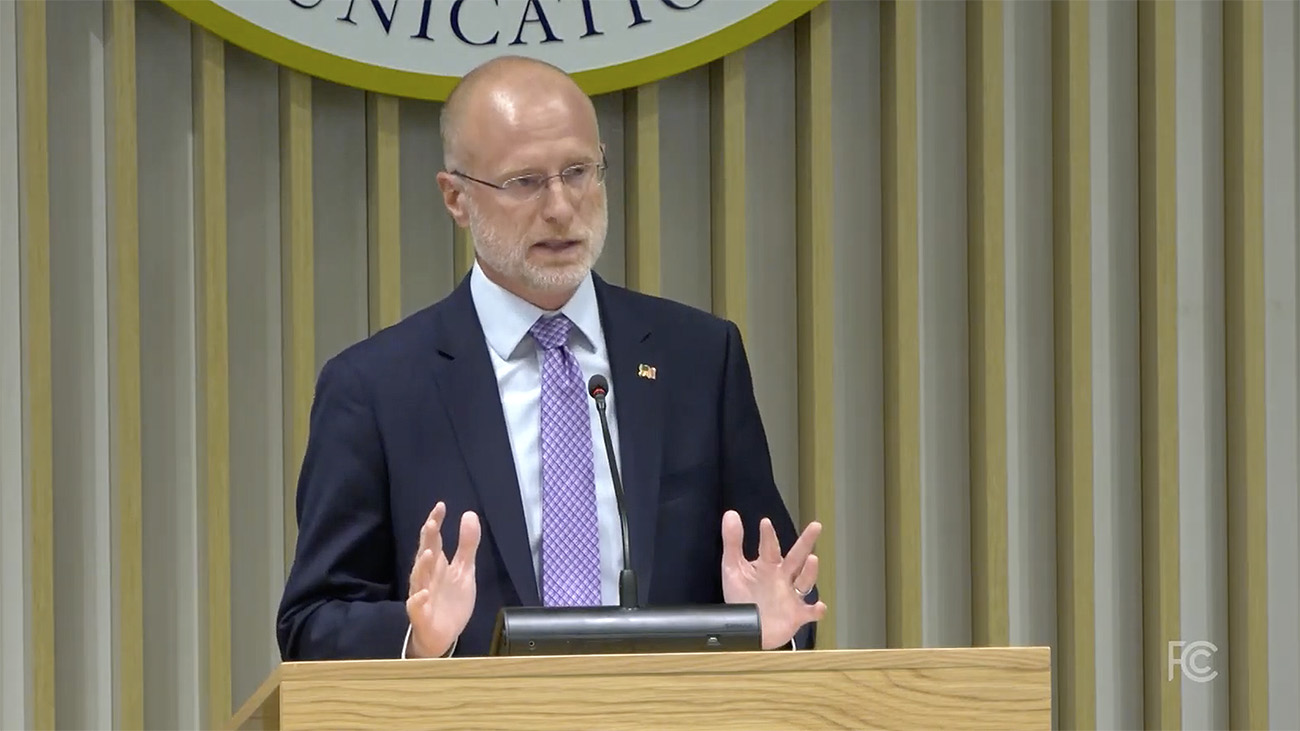FCC Chairman Carr floats license revocation in media interview

Weekly insights on the technology, production and business decisions shaping media and broadcast. Free to access. Independent coverage. Unsubscribe anytime.
Federal Communications Commission Chairman Brendan Carr has indicated he remains open to revoking broadcast licenses from television stations that fail to meet the agency’s public interest standards, according to comments made during an interview with Media Research Center President David Bozell posted to YouTube.
“I’ve said from the get-go: Broadcast licenses are not sacred cows. If you think there’s nothing you can do to lose a license, then it’s not a license. That’s called a property right,” Carr said in the interview, which aired during what the participants called “Free Speech Week.”
The conversation between Carr and Bozell, whose organization has long criticized what it views as “liberal bias” in mainstream media, covered familiar territory for both participants.
While the wide-ranging discussion touched on topics from free speech to removing Chinese hardware from U.S. networks via Operation Clean Carts, Carr’s most notable comments concerned the future of broadcast licenses.
The chairman drew a sharp distinction between national programmers like Disney, Comcast, and Paramount — which the FCC does not license — and local broadcast stations that carry their programming. Carr emphasized that these local stations hold FCC licenses and face potential consequences for failing to serve the public interest.
While acknowledging that a “whole process” would need to be followed, Carr appeared to suggest that some broadcasters “may very well end up losing their licenses.”
The chairman’s framing of the issue reveals potential tensions in how the public interest standard might be applied. Carr told Bozell that licensed broadcasters “can’t run sort of a narrow, partisan circus,” yet the definition of “partisan programming” versus legitimate editorial choices remains unclear.
Carr pointed to the recent Jimmy Kimmel controversy, in which some ABC affiliates temporarily declined to air the late-night host’s program, as a positive development. He characterized local stations pushing back against network programming for “a week” as “a win for re-empowering those local broadcasters.”
However, Carr’s own acknowledgment that stations “were never going to be able to hold out forever, just given the balance of power” underscores the limited leverage affiliates have against major networks.
His suggestion that the FCC might strengthen preemption rights raises questions about potential government intervention in programming decisions.
Carr’s noted during the interview that the FCC has “walked away from enforcing the public interest standard” over recent decades. Yet his examples of positive change — NPR and PBS defunding, CBS committing to “fact-based journalism” — suggest a particular interpretation of what public interest means.
Carr’s statement that these changes stem from Donald Trump and organizations like MRC indicates a potential alignment between regulatory enforcement and political perspectives. This raises concerns about whether public interest determinations might be influenced by ideological considerations rather than objective standards.
While Carr mentioned that license revocation would require “a whole process that has to be run,” he provided no specifics about what violations might trigger such proceedings or what safeguards would protect against arbitrary enforcement. The broadcast industry has operated for decades under the assumption that license renewal, while not guaranteed, follows established procedures and precedent.
The chairman’s casual suggestion that broadcasters could lose licenses, made in a friendly interview rather than through formal FCC channels, may itself raise procedural questions about how such significant regulatory shifts would be implemented.
For broadcast station owners and operators, Carr’s comments signal potential uncertainty in the regulatory environment. The suggestion that licenses could be at risk based on evolving interpretations of public interest obligations may affect business decisions, programming choices, and the overall value of broadcast properties.
The timing of these remarks, early in Carr’s chairmanship and the Trump administration, suggests broadcasters may need to prepare for a more aggressive enforcement approach… though whether that enforcement would be applied uniformly across the political spectrum remains to be seen.





tags
Brendan Carr, Deregulation, FCC, Media Research Center
categories
Broadcast Business News, Broadcast Industry News, Heroes, Policy